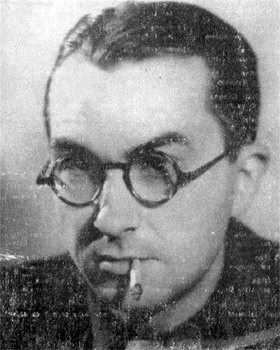|
Henri Lefebvre
Henri Lefebvre ( ; ; 16 June 1901 – 29 June 1991) was a French Marxist philosopher and sociologist, best known for furthering the critique of everyday life, for introducing the concepts of the right to the city and the production of social space, and for his work on dialectical materialism, alienation, and criticism of Stalinism, existentialism, and structuralism. In his prolific career, Lefebvre wrote more than sixty books and three hundred articles. He founded or took part in the founding of several intellectual and academic journals such as ''Philosophies'', ''La Revue Marxiste'', ''Arguments'', ''Socialisme ou Barbarie'', and ''Espaces et Sociétés''. Biography Lefebvre was born in Hagetmau, Landes, France. He studied philosophy at the University of Paris (the Sorbonne), graduating in 1920. By 1924 he was working with Paul Nizan, Norbert Guterman, Georges Friedmann, Georges Politzer, and Pierre Morhange in the ''Philosophies'' group seeking a "philosophical rev ... [...More Info...] [...Related Items...] OR: [Wikipedia] [Google] [Baidu] |
Western Philosophy
Western philosophy refers to the Philosophy, philosophical thought, traditions and works of the Western world. Historically, the term refers to the philosophical thinking of Western culture, beginning with the ancient Greek philosophy of the Pre-Socratic philosophy, pre-Socratics. The word ''philosophy'' itself originated from the Ancient Greek (φιλοσοφία), literally, "the love of wisdom" , "to love" and σοφία ''Sophia (wisdom), sophía'', "wisdom". History Ancient The scope of ancient Western philosophy included the problems of philosophy as they are understood today; but it also included many other disciplines, such as pure mathematics and natural sciences such as physics, astronomy, and biology (Aristotle, for example, wrote on all of these topics). Pre-Socratics The pre-Socratic philosophers were interested in cosmology (the nature and origin of the universe), while rejecting unargued fables in place for argued theory, i.e., dogma superseded reason, ... [...More Info...] [...Related Items...] OR: [Wikipedia] [Google] [Baidu] |
Rhythmanalysis
''Rhythmanalysis: Space, Time and Everyday Life'' is a collection of essays by Marxist sociologist and urbanist philosopher Henri Lefebvre. The book outlines a method for analyzing the rhythms of urban spaces and the effects of those rhythms on the inhabitants of those spaces. It builds on his past work, with which he argued space is a production of social practices. Two concluding essays are co-authored by Catherine Régulier and had been previously published in the 1980's. The book is considered to be the fourth volume in his ''Critique of Everyday Life''. Published after his death in 1992, ''Rhythmanalysis'' is Lefebvre's last book. It was first translated into English by Stuart Elden and Gerald Moore in 2004. Origins of rhythmanalysis The term "rhythmanalysis" was coined by Portuguese philosopher Lúcio Alberto Pinheiro dos Santos in a lost 1931 manuscript which focused on the physiological dimensions of rhythms. His ideas on rhythmanalysis are explicated in and further develo ... [...More Info...] [...Related Items...] OR: [Wikipedia] [Google] [Baidu] |
Paul Nizan
Paul-Yves Nizan (; 7 February 1905 – 23 May 1940) was a French philosopher and writer. He was born in Tours, Indre-et-Loire and studied in Paris where he befriended fellow student Jean-Paul Sartre at the Lycée Henri IV. He became a member of the French Communist Party, and much of his writing reflects his political beliefs, although he resigned from the party soon after the Molotov–Ribbentrop Pact in 1939. He died in the Battle of Dunkirk, fighting against the German army in World War II. His works include the novels ''Antoine Bloye'' (1933), ''Le Cheval de Troie'' 'The Trojan Horse''and ''La Conspiration'' 'The Conspiracy''(1938), as well as the essays "Les Chiens de garde" The Watchdogs"(1932) and "Aden Arabie" (1931), which introduced him to a new audience when it was republished in 1960 with a foreword by Sartre. In particular, the opening sentence "I was twenty, I won't let anyone say those are the best years of your life" (''J’avais vingt ans. Je ne laisserai pers ... [...More Info...] [...Related Items...] OR: [Wikipedia] [Google] [Baidu] |
Landes (department)
Landes (; ; ) is a department in the Nouvelle-Aquitaine region, Southwestern France, with a long coastline on the Atlantic Ocean to the west. It also borders Gers to the east, Pyrénées-Atlantiques to the south, Lot-et-Garonne to the north-east, and Gironde to the north. Located on the Atlantic coast, it had a population of 413,690 as of 2019.Populations légales 2019: 40 Landes INSEE Its is Mont-de-Marsan. The department is the second-largest department in France and it covers the [...More Info...] [...Related Items...] OR: [Wikipedia] [Google] [Baidu] |
Arguments Group
The Arguments group was a collection of French intellectuals, mostly ex-Communists, who were active in the late 1950s and early 1960s. The group, whose members had been shaped by their participation in the French Resistance and subsequent disillusionment with the French Communist Party, particularly after the Soviet suppression of the Hungarian Revolution of 1956, sought to revitalize Marxism by engaging with new intellectual currents and social phenomena. Many of the group's members held academic positions in Paris, and their work had a significant influence on the development of the New Left. Key figures and influences Key figures in the Arguments group included Kostas Axelos, Francois Chatelet, Jean Duvignaud, Pierre Fougeyrollas, Henri Lefebvre, and Edgar Morin. The group coalesced around the journal ''Arguments'', founded in late 1956. Modeled on the Italian journal ''Argomenti'', ''Arguments'' aimed to cultivate open Marxist debate and discussion. It welcomed contributio ... [...More Info...] [...Related Items...] OR: [Wikipedia] [Google] [Baidu] |
Structuralism
Structuralism is an intellectual current and methodological approach, primarily in the social sciences, that interprets elements of human culture by way of their relationship to a broader system. It works to uncover the structural patterns that underlie all the things that humans do, think, perceive, and feel. Alternatively, as summarized by philosopher Simon Blackburn, structuralism is: Blackburn, Simon, ed. 2008. "Structuralism." In '' Oxford Dictionary of Philosophy'' (2nd rev. ed.). Oxford: Oxford University Press. . p. 353."The belief that phenomena of human life are not intelligible except through their interrelations. These relations constitute a structure, and behind local variations in the surface phenomena there are constant laws of abstract structure." History and background The term ''structuralism'' is ambiguous, referring to different schools of thought in different contexts. As such, the movement in humanities and social sciences called structuralism r ... [...More Info...] [...Related Items...] OR: [Wikipedia] [Google] [Baidu] |
Existentialism
Existentialism is a family of philosophical views and inquiry that explore the human individual's struggle to lead an authentic life despite the apparent absurdity or incomprehensibility of existence. In examining meaning, purpose, and value, existentialist thought often includes concepts such as existential crises, angst, courage, and freedom. Existentialism is associated with several 19th- and 20th-century European philosophers who shared an emphasis on the human subject, despite often profound differences in thought. Among the 19th-century figures now associated with existentialism are philosophers Søren Kierkegaard and Friedrich Nietzsche, as well as novelist Fyodor Dostoevsky, all of whom critiqued rationalism and concerned themselves with the problem of meaning. The word ''existentialism'', however, was not coined until the mid 20th century, during which it became most associated with contemporaneous philosophers Jean-Paul Sartre, Martin Heidegger, Simone de Beau ... [...More Info...] [...Related Items...] OR: [Wikipedia] [Google] [Baidu] |
Stalinism
Stalinism (, ) is the Totalitarianism, totalitarian means of governing and Marxism–Leninism, Marxist–Leninist policies implemented in the Soviet Union (USSR) from History of the Soviet Union (1927–1953), 1927 to 1953 by dictator Joseph Stalin and in Satellite state#Post-World War II, Soviet satellite states between 1944 and 1953. Stalinism included the creation of a Rule of man, one man totalitarian police state, rapid Industrialization in the Soviet Union, industrialization, the theory of socialism in one country, forced Collective farming, collectivization of agriculture, intensification of the class struggle under socialism, intensification of class conflict, a Joseph Stalin's cult of personality, cult of personality, and subordination of the interests of foreign Communist party, communist parties to those of the Communist Party of the Soviet Union, which Stalinism deemed the leading Vanguardism, vanguard party of communist revolution at the time. After Stalin's dea ... [...More Info...] [...Related Items...] OR: [Wikipedia] [Google] [Baidu] |
Dialectical Materialism
Dialectical materialism is a materialist theory based upon the writings of Karl Marx and Friedrich Engels that has found widespread applications in a variety of philosophical disciplines ranging from philosophy of history to philosophy of science. As a materialist philosophy, Marxist dialectics emphasizes the importance of real-world conditions and the presence of functional contradictions within and among social relations, which derive from, but are not limited to, the contradictions that occur in social class, labour economics, and socioeconomic interactions. Within Marxism, a contradiction is a relationship in which two forces oppose each other, leading to mutual development. In contrast with the idealist perspective of Hegelian dialectics, the materialist perspective of Marxist dialectics emphasizes that contradictions in material phenomena could be resolved with dialectical analysis, from which is synthesized the solution that resolves the contradiction, whilst retain ... [...More Info...] [...Related Items...] OR: [Wikipedia] [Google] [Baidu] |
Everyday Life
Everyday life, daily life or routine life comprises the ways in which people typically act, think, and feel on a daily basis. Everyday life may be described as mundane, routine, natural, habitual, or Normality (behavior), normal. Human diurnality means most people sleep at least part of the night and are active in daytime. Most eat two or three meals in a day. Working time (apart from shift work) mostly involves a daily schedule, beginning in the morning. This produces the daily rush hours experienced by many millions, and the drive time focused on by radio broadcasters. Evening is often leisure time. Bathing every day is a custom for many. Beyond these broad similarities, lifestyles vary and different people spend their days differently. For example, nomadic life differs from sedentism, and among the sedentary, Urban area, urban people live differently from Rural area, rural folk. Differences in the lives of the wealth, rich and the poverty, poor, or between manual labor, ... [...More Info...] [...Related Items...] OR: [Wikipedia] [Google] [Baidu] |
Sociology
Sociology is the scientific study of human society that focuses on society, human social behavior, patterns of Interpersonal ties, social relationships, social interaction, and aspects of culture associated with everyday life. The term sociology was coined in the late 18th century to describe the scientific study of society. Regarded as a part of both the social sciences and humanities, sociology uses various methods of Empirical research, empirical investigation and critical analysis to develop a body of knowledge about social order and social change. Sociological subject matter ranges from Microsociology, micro-level analyses of individual interaction and agency (sociology), agency to Macrosociology, macro-level analyses of social systems and social structure. Applied sociological research may be applied directly to social policy and welfare, whereas Theory, theoretical approaches may focus on the understanding of social processes and phenomenology (sociology), phenomenologic ... [...More Info...] [...Related Items...] OR: [Wikipedia] [Google] [Baidu] |
Philosopher
Philosophy ('love of wisdom' in Ancient Greek) is a systematic study of general and fundamental questions concerning topics like existence, reason, knowledge, Value (ethics and social sciences), value, mind, and language. It is a rational and critical inquiry that reflects on its methods and assumptions. Historically, many of the individual sciences, such as physics and psychology, formed part of philosophy. However, they are considered separate academic disciplines in the modern sense of the term. Influential traditions in the history of philosophy include Western philosophy, Western, Islamic philosophy, Arabic–Persian, Indian philosophy, Indian, and Chinese philosophy. Western philosophy originated in Ancient Greece and covers a wide area of philosophical subfields. A central topic in Arabic–Persian philosophy is the relation between reason and revelation. Indian philosophy combines the Spirituality, spiritual problem of how to reach Enlightenment in Buddhism, enlighten ... [...More Info...] [...Related Items...] OR: [Wikipedia] [Google] [Baidu] |





